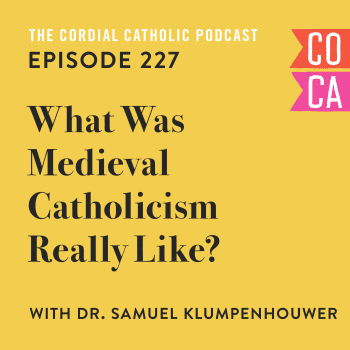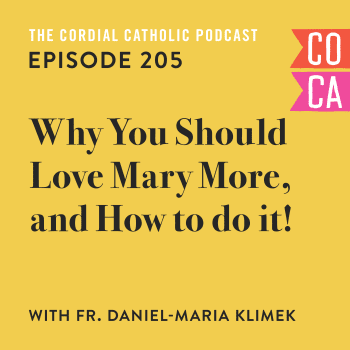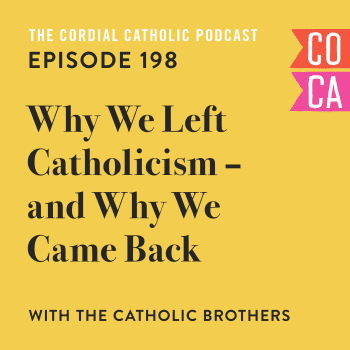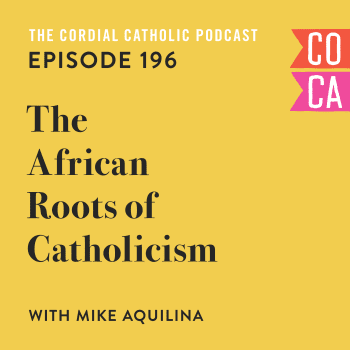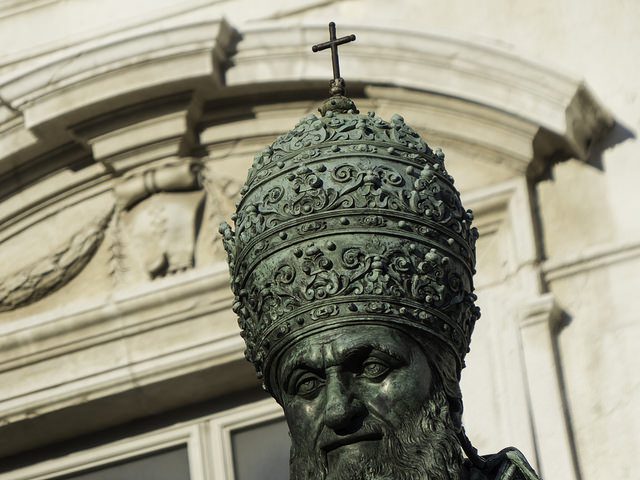
It shouldn’t come as a surprise to you to learn that I love the Pope. You, my dear readers and friends, are a long-suffering bunch and nothing should really come as a surprise to you anymore. But, I do love the Pope, and I’m going to tell you why.
The Pope is an audacious person. The present Pope, perhaps not so much, but the office of the Pope in and of itself is an affront to our modern culture and sensibilities. A man, first of all, a man, claiming to represent all Catholics everywhere. Nevermind that, but he’s making the historically ludicrous claim that he’s stands in an unbroken line of apostles going back to Peter, who Catholics say is the very first Pope.
And don’t forget, the Pope claims the authority to speak infallibly. That is, he claims to have the authority to make decisions which are binding on all Catholic Christians—and have the weight of the authority of God behind them.
So, why am I crazy enough to love the Pope? And why would you?
The Historic Papacy
Catholics claims about the Pope are pretty audacious, yes, but the more I began to dig into Catholic theology and, indeed, the theology of Christianity up until the Reformation, I discovered that these claims are, incredibly, well founded. Remarkably, the idea that the Pope isn’t the head of the global Christian church is the rather novel, not the other way around.
Without pretending that the Pope was always and forever recognized as the sole decider of the Catholic Church, it’s safe to say that the authority of the office of Peter, and the position of the Pope, was always a significant arbiter in the Christian Church up to the Reformation. Even for the Early Church, for the councils that got together to decide on doctrine, theology, and the biblical canon, it was the presence (or the recognition) of the Popes that made them infallibly binding. Councils that did not have the papal nod did not receive the infallible distinction. This is vital to understanding the authority of the Pope even to the early Christian Church.
The Protestant who doesn’t recognize that the Pope was granted authority from God has a very difficult road ahead of himself in explaining how the Bible came to be.
Following the Reformation the papacy became even more important in response to the Protestant schism. In large part, local distinctions within the Church began to be smoothed out and the centralization of decision-making power (back) to the papacy, the Bishop of Rome, was a natural response to Church division.
The Papacy in Typology
Ultimately, Catholicism asserts, the Pope has authority, based on the charge of Jesus to build His Church on Peter, who He calls the rock. Peter was the first Pope and like the apostles in the New Testament, and the bishops that followed them, the office of Peter was always intended to be passed on and not pass away. This, Catholic theologians argue, is evident in the way the words of Jesus echo the words used in Isaiah referring to the steward of the kingdom of David. This steward held the keys to the Davidic kingdom and was given authority likewise.
This illusion to the Hebrew Scriptures, Catholic theologians argue, would’ve been obvious to any pious Jew in Jesus’s time—and to the early Christians as they chose Peter’s successor. Certainly, in the centuries following the Reformation this was an oft-used appeal by Catholics for keeping the Christian Church together, under the Pope.
But what’s even more, Catholics can, with mind-boggling certainty, trace the apostolic chain of command right from Peter to Pope Francis himself. A line of apostolic succession. In fact the earliest preserved writings of the Church Fathers include those of Clement, who is seen as Catholics to be the Bishop of Rome and the third Pope. Pope Linus, regarded as the Pope who succeeded Peter, is mentioned along with Clement in the canonical New Testament but doesn’t appear to have written anything down. The strong silent type.
The Practicality of the Pope
So why do I love the Pope, and why would you?
Because as audacious and ludicrous the claim might be it makes sense.
It makes sense to me that God would leave for us a representative, the Vicar of Christ, with the ultimate authority to teach us how to live and what the Word of God means. And to represent God to us. In the same way that it makes sense, to me, that God would leave us a Church to help us live and interpret His will.
As a Protestant there is no one that comes close to credibly making the claim of the Pope. Those that do are radicals, or maniacs. For a Protestant, in the low church tradition I grew up in, the closest we could come to a Pope would be our pastor. If we really stretched it perhaps our regional denomination president. In any case, neither of these otherwise holy men were making any claim of authority. Neither of these men stood so audaciously and said, “Look at me, act like me. I will keep the keys until Christ’s return.” They would’ve been ushered out the back door, quietly.
The Pope stands, uniquely, as a pointer to Christ. He makes a powerful and beautiful claim to power.
I’ve come to love the saints in the same way. I’ve come to love statues, stories, and devotions of this nature precisely because they point to Christ, and remind me of how to live a holy and upright life. In the midst of the busy day I can recall and remember a particular saint that’s praying for me. A real person that lived that says, “I relied on Jesus too, He is God; I’ve been there, and I’ll pray for you.” All saints and devotions to them point towards Christ.
In the same way, the Pope actively points to Christ. The Pope kisses babies, waves in St. Peter’s square, heads church councils and meetings, oversees reform and church law, and serves the poor in place of Christ. He is, in a very real sense, the hands and feet of Christ that we’re all urged to become. And I love the Pope when He does this stuff.
And I love God that He gave us this incredible gift: the gift of a person who can be his Vicar, the Servant of all Christian servants. A diplomat. An envoy. An ambassador.
Sure, the office of the Pope can be abused. It has been abused and it will probably be abused again. It’s a topic for another, fuller time, but just because Popes may speak infallibly doesn’t necessarily equate to impeccability. Some Popes are awful; some Popes are evil. But if God gave us the Catholic Church and a Pope at its head than it can be, and is, a beautiful thing. It’s a gift, like the Church itself, that points to Christ and His return.








